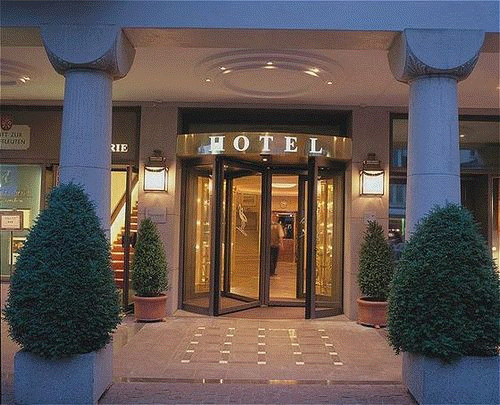Get Worse

Perhaps it was the hurricane, but the place in Houston was a great example of a hotel on the slide. The furnishings were expensive, and the foyer was the usual riot of strelitzia, but there was no diced melon at the breakfast buffet, and this was certainly a shock. The coffee came in paper cups. I had to wash the room service chicken under the tap because it was so salt-encrusted and I was so hungry, and there was nothing else to do. These small domestic acts humiliate us in hotel rooms, or make us, at the very least, hold our breath. It takes some time to possess these spaces, if we ever do: meanwhile we steal and despoil things, we sneak around. The Royalton in Manhattan is so dark that it, "makes you feel as if you are up to no good," as a fellow writer said, "even if you are just going about your business." The attempt at drama, or at stating the drama, doesn't always succeed so well --- which is the drama of being alone. Maybe I am too used to solitude; I am happy enough with the presences, or agitations, silence brings. When I am at home, I don't even need the radio. Even so, I tread lightly on hotel carpet and I never shake that sense of immanence.
But, you know, you take a shower and nothing happens. The endless corridor is often empty. The men in suits with conference lanyards nod as they get in the lift and, in Toronto, one of them said: "Great shoes!"
They are clean, nice men. Everyone washes in the morning, and they wash again before changing and going out to dinner. And sometimes it is nice to have a shower before bed.
Hotel bathrooms are highly fetishised, with their rows of toiletries, and the possibility of a sewing kit. I love the showers and have a faint, geological interest in the tiling (so much marble!), but I hate the toiletries, most of which could strip paint. There was a nice body lotion by Roger & Gallet once, that smelt of cucumber --- but once is not enough out of so many, many hundreds of little plastic bottles, refilled or thrown away by the chambermaid the next day. I hope she steals them, as I do not. I hate the waste, or I do not get any pleasure from the waste.
Some people love hotels. I don't know why. They can be nice if you are with someone, but so many people in these places are on their own. I am as partial as anyone to a bit of Siberian duck down, but the glamour of it all escapes me (or I resist it): that mild sense of danger, the promise that indulgence might turn, at any moment, to adventure.
I don't think of hotel rooms as exciting or sexual spaces, not because the light switches are so complicated, and the upholstery often mildly offensive, but because experience tells me that they are not sexual spaces, actually. They are spaces that are empty, and therefore full of potential, but this is not the same thing.
This is what the porn channels are for, perhaps; to crystallise the sense of potential and name the unease. Me, I watch the news. I am very suspicious of porn. Why, for example, do people describe it as being "consumed?" You don't say that a film is "consumed" or even a prostitute. I have been in hotels, in the past, in Bucharest and Dakar, where I was the only woman not actively working the foyer, and this did not unsettle me. The fiction these women present is so thin, the underlying realities, of sex and money, so very real: there is a rage in this transaction against appearance, which makes it the opposite of the hotel dream.
It is a melancholy thing, to pass hundreds of thousands of people on the road and remember so few. Four black-suited men pushing aerial photographs around a table in Bogotá airport with thick, manicured fingers. A rich man in New York saying, "These people," into the empty air over his breakfast, and then looking back down at his plate. An African businessman waiting on his flight to Entebbe; reading Getting to Yes: Negotiating Agreement without Giving In.
The most powerful men are not on these planes, they are on private jets, but some of the men on the planes are powerful enough, especially towards the front. Jet-lagged, laundered, serviced, perfumed; with their rituals and tricks: the tablets of melatonin, the Litebooks and exercise bands; with their plastic money in two different pockets, and their information stored online. They sleep under the same slippery white sheets, in different time zones, with the same pay-per-view, and there is always melon in the breakfast buffet. Don't tell me what they sell is real. In 2008, they were already running on empty, their legs spinning faster, like the Road Runner out over the canyon drop. I think they knew.
In May I listen to someone from Man Investments tell me that bankers don't read novels ("Really? How interesting.") I ask him what is coming "down the pipes," because this is how business people describe the future, these days, and he says, "What is the worst that you can imagine?" then pauses for effect. "Well, it's going to be much worse than that."
The London Review of Books
28 May 2009